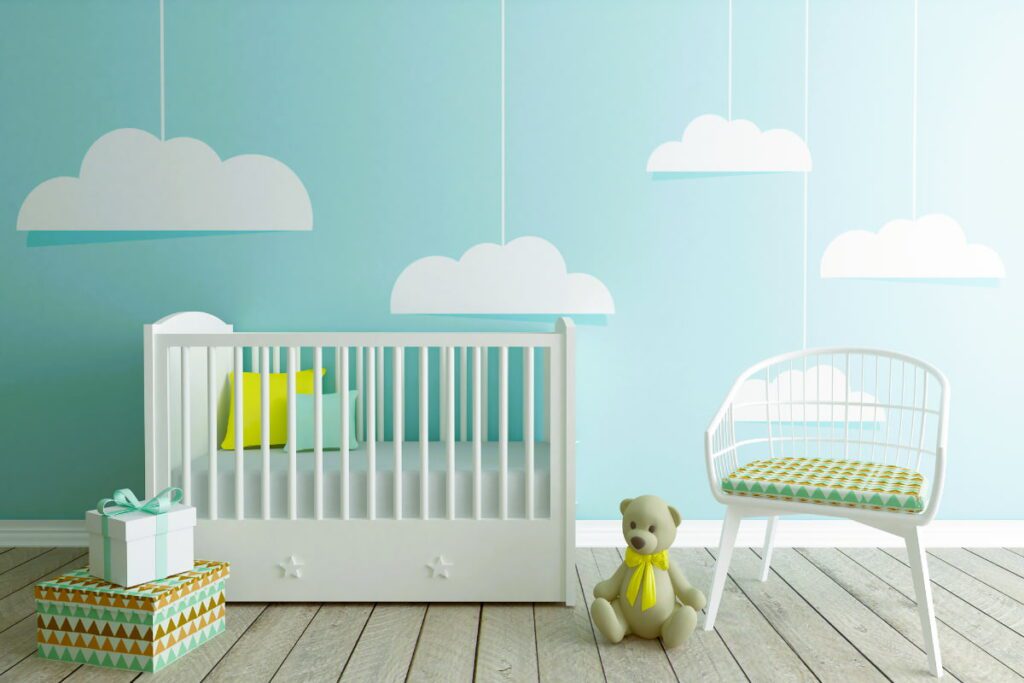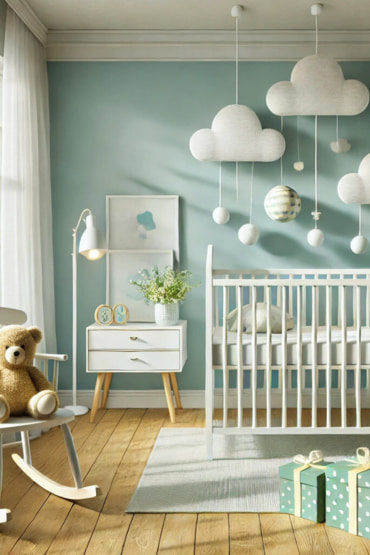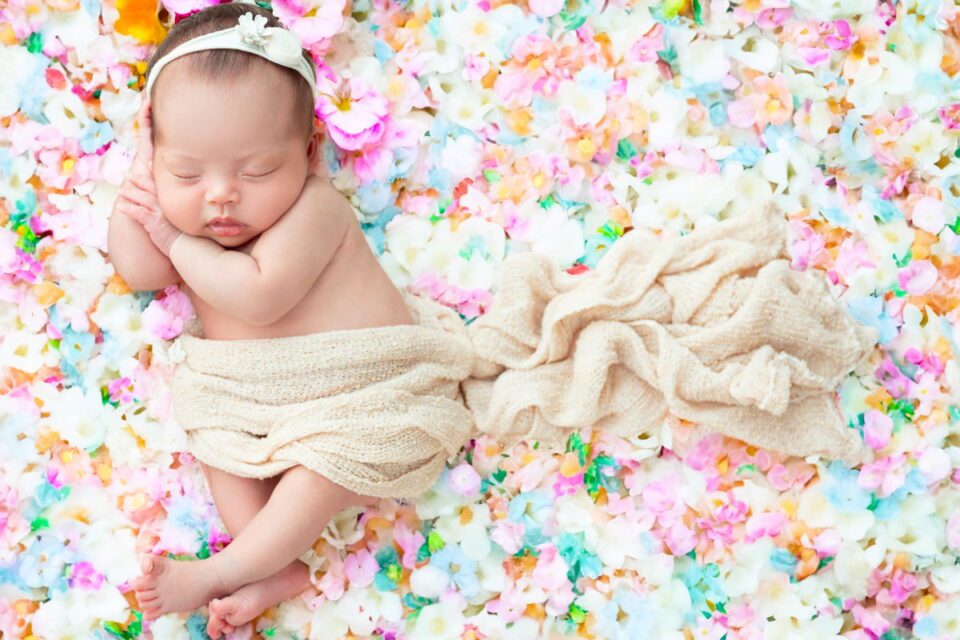Bringing a newborn into the world is an incredible joy, but it also comes with its own set of challenges, especially when it comes to ensuring your little one gets the sleep they need. Sleep is crucial for a newborn’s development and well-being, and establishing healthy sleep habits early on can make a significant difference for both baby and parents. In this guide, we’ll explore newborn sleep cycles, duration, sleep environment, and provide practical tips to help your baby drift into a peaceful slumber.
Table of Contents
Understanding Newborn Sleep Cycles
Understanding the differences between REM (Rapid Eye Movement) and NREM (Non-Rapid Eye Movement) sleep in infants is crucial, as each plays a distinct role in their development.
Newborns have a unique sleep pattern that is different from adults. They spend a significant amount of time sleeping, with an average of 14 to 17 hours a day. Babies’ sleep cycles are divided into two main stages: REM (Rapid Eye Movement) and NREM (Non-Rapid Eye Movement).
REM Sleep:
- Characteristics: Also known as active sleep, REM sleep is marked by rapid eye movements, irregular breathing, increased brain activity, and spontaneous movements.
- Developmental Significance: REM sleep is believed to facilitate brain maturation and the formation of neural connections. It plays a role in processing experiences and consolidating memories, which are vital for cognitive development. In early infancy, a substantial portion of sleep is spent in REM, supporting rapid brain growth.
NREM Sleep:
- Characteristics: Referred to as quiet sleep, NREM is characterized by regular breathing, minimal movement, and slower brain waves.
- Developmental Significance: NREM sleep is associated with physical restoration, energy conservation, and the release of growth hormones. It contributes to physical growth and strengthens the immune system. As infants age, the proportion of NREM sleep increases, aligning with their physical development needs.
Sleep Cycle Development:
Newborns experience shorter sleep cycles, approximately 50-60 minutes, alternating between REM and NREM sleep. Over time, these cycles lengthen, and the structure becomes more similar to adult sleep patterns. Initially, infants may enter sleep through REM, but as they mature, NREM sleep typically precedes REM.
I loved you from the very start. You stole my breath, embraced my heart. Our lIfe together has just begun. You’re part of me, my lIttle one
Implications for Parents:
- Sleep Environment: Recognizing that infants spend a significant amount of time in REM sleep, which is a lighter sleep stage, it’s essential to minimize disturbances to prevent frequent awakenings.
- Sleep Positioning: Understanding the characteristics of each sleep stage can help in creating optimal sleep conditions. For instance, ensuring a safe sleep environment during NREM sleep, when infants are less responsive, is crucial.
- Developmental Monitoring: Observing sleep patterns can provide insights into an infant’s neurological development. Significant deviations from typical sleep patterns may warrant consultation with a pediatrician.
By understanding the distinct roles of REM and NREM sleep, parents can better appreciate the importance of healthy sleep habits in their infant’s growth and development. It is important to be aware of these sleep cycles to establish a sleep routine that is aligned with the baby’s natural rhythm. A consistent sleep routine helps to promote healthy sleep habits, which are beneficial for the baby’s overall growth and development

Newborn Sleep Duration
Newborn babies need a lot of sleep, as their bodies are growing and developing at a rapid pace. However, their sleep is usually fragmented into shorter periods throughout the day and night. On average, a newborn may sleep anywhere from 14 to 17 hours per day, but this can vary widely from baby to baby.
It’s important to understand and respect your baby’s sleep habits, as a lack of proper sleep can adversely affect their overall health and well-being. Newborns may take several naps throughout the day, with each nap lasting anywhere from 30 minutes to a few hours. These naps help them to recharge their bodies and minds, and provide the necessary rest needed for optimal development.
While it’s essential to ensure that your baby gets enough sleep, it’s also important to note that every baby is different. As your baby grows and develops, their sleep patterns will likely change as well. By paying close attention to your baby’s cues and adjusting their sleep routine as needed, you can help them get the rest they need for a happy and healthy start to life.
Creating the Ideal Sleep Environment
The sleep environment plays a crucial role in ensuring your newborn sleeps soundly. Consider these tips:
- Comfortable Crib: Invest in a quality crib with a firm mattress and fitted sheets. Ensure there are no soft toys or loose bedding to create a safe sleep environment for your baby.
- Ideal Room Temperature: Keep the room comfortably cool, around 68-72°F (20-22°C). Dress your baby in light layers to maintain an optimal body temperature.
- Differentiate between Daytime and Nighttime Sleep: Let newborns nap in a light room during the day, without swaddling and with noise. Conversely, create a dark and quiet sleep environment by using blackout curtains during nighttime sleep in order to help establish their circadian rhythm. Use soft, dim lighting during nighttime feedings and diaper changes to avoid disrupting your baby’s sleep-wake cycle.
You’re my favorIte reason to lose sleep
It’s important to note that individual babies may have different preferences, and parents should be attuned to their baby’s cues. Additionally, while establishing a routine and sleep environment is valuable, newborns may still have irregular sleep patterns, and it’s normal for them to wake frequently for feeding and care during the night. Always consult with healthcare professionals for personalized advice based on the specific needs of your baby.
15 Evidence-Based Tips for Newborn Sleep
Getting a newborn to sleep can be challenging, but with patience and consistency, you can establish a bedtime routine that works for both of you:

- Establish a Bedtime Routine
Create a calming routine with activities like bathing, singing lullabies, or reading. Studies from the American Academy of Pediatrics (AAP) show that consistent routines improve newborn sleep quality and duration. Try to put your baby to bed at the same time each night. Consistency helps regulate their internal clock, promoting better sleep. - Understand Sleep Cycles
Newborns alternate between REM (active) and NREM (quiet) sleep every 50-60 minutes. REM sleep supports brain development, while NREM aids physical recovery. Learning these patterns helps parents respond appropriately to their baby’s needs. (Source: National Institute of Neurological Disorders and Stroke – NINDS) - Encourage Skin-to-Skin Contact
Holding your newborn skin-to-skin during the day has been shown to improve nighttime sleep and emotional regulation. (Source: PubMed Study on Skin-to-Skin Care, 2015) - Create a Dark and Quiet Environment
Darkness signals the production of melatonin, the hormone that regulates newboen sleep. Using blackout curtains and minimizing noise helps your newborn fall asleep faster. (Source: Journal of Clinical Sleep Medicine) - Expose Babies to Natural Light
Daily exposure to sunlight helps regulate circadian rhythms, gradually teaching newborns the difference between day and night. (Source: National Institutes of Health – NIH) - Practice Safe Sleep Guidelines
Always place your baby on their back on a firm mattress with no loose bedding to reduce SIDS risk. Avoid co-sleeping in the same bed. (Source: American Academy of Pediatrics Safe Sleep Policy) - Adapt Sleep Practices to Family Culture
Sleep practices vary across cultures. For example, co-sleeping is common in many Asian countries and often includes safety adaptations. Families should adopt practices that align with their values while ensuring safety. (Source: Cultural Variation in Infant Sleep – NIH) - Avoid Overstimulation Before Bed
Newborns can become overtired if overstimulated by bright lights, loud noises, or excessive playtime right before sleep. A calm environment prepares their bodies for rest. (Source: AAP Parenting Guidelines) - Encourage Short, Frequent Daytime Naps
Newborns need 14-17 hours of sleep spread across short naps. Structured daytime newborn sleep reduces nighttime wake-ups. (Source: PubMed Study on Sleep Distribution in Infants) - Swaddle Safely
Swaddling provides comfort but should be done correctly to avoid overheating or hip dysplasia. Stop swaddling once the baby can roll over. (Source: International Hip Dysplasia Institute) - Respond to Sleep Cues
Watch for signs like rubbing eyes or yawning, which signal readiness for sleep. Putting babies to bed before they become overtired reduces bedtime struggles. (Source: NIH Guide to Infant Behavior) - Limit Nighttime Feeding Gradually
Night feeding is common, but over time, reduce these sessions to help your baby adjust to longer sleep stretches at night. (Source: National Sleep Foundation) Ensure your baby is well-fed before bedtime. A full tummy can contribute to a longer and more restful newborn sleep. - Use White Noise Mindfully
White noise can soothe infants and mask environmental sounds, but avoid high volumes. Prolonged exposure could impact hearing or language development. (Source: NIH Hearing Research) - Encourage Self-Soothing
As babies grow, give them opportunities to fall asleep on their own after gentle soothing. This helps build independent sleep skills. (Source: AAP Sleep Recommendations) - Seek Professional Advice if Sleep Patterns Are Irregular
If your baby struggles with sleep despite your efforts, consult a pediatrician or newborn sleep specialist. Irregular sleep could signal underlying issues. (Source: Journal of Pediatrics and Child Health)
10 Mistakes to Avoid for Newborn Sleep
Ensuring your newborn’s safety and well-being involves being aware of common pitfalls. Here are some mistakes experts advise parents to avoid:

- Overheating the Baby
Over-bundling your infant can increase the risk of Sudden Infant Death Syndrome (SIDS). It’s crucial to dress your baby appropriately for the room temperature and avoid excessive layers. - Comparing Your Baby to Others
Each baby develops at their own pace. Constant comparisons can lead to unnecessary stress and unrealistic expectations. - Ignoring Safe Sleep Practices
Not following recommended newborn sleep guidelines, such as placing your baby on their back to sleep, can pose serious risks. Always adhere to safe sleep recommendations to protect your infant. - Leaving the Baby Unattended
Never leave your newborn alone, especially in potentially hazardous situations like on a changing table, in the bath, or with pets. Constant supervision is key to preventing accidents. - Introducing Solids Too Early
Introducing solid foods before your baby is developmentally ready can lead to digestive issues and increase the risk of allergies. It’s important to wait until your baby shows signs of readiness, typically around six months of age. - Using Unsafe Sleep Accessories
Items like crib bumpers, loose bedding, and stuffed animals in the crib can pose suffocation hazards. Ensure the crib is free from such items to maintain a safe newborn sleep environment. - Not Seeking Help When Needed
Parenting can be overwhelming, and it’s important to seek support when necessary. Whether it’s from healthcare professionals, family, or parenting groups, assistance is available. - Overlooking Baby’s Gut Health
A healthy gut is crucial for your baby’s overall development. Neglecting this aspect can lead to issues like allergies or digestive problems. Consider probiotics or consult a pediatrician for guidance. - Allowing Prolonged Crying
Leaving a baby to “cry it out” for extended periods can cause stress and anxiety. It’s important to respond to your baby’s needs to build trust and security. - Inconsistent Feeding Schedules
Erratic feeding times can disrupt your baby’s digestion and sleep patterns. Establishing a consistent feeding routine helps in promoting better health and development.
By being mindful of these common mistakes, you can create a safer and more nurturing environment for your newborn, fostering healthy growth and development.
Support for Parents
Parenting a newborn is a beautiful yet demanding journey. It’s essential to prioritize your well-being as well:
- Share Responsibilities: If possible, share nighttime responsibilities with your partner or a trusted family member. This allows both parents to get the rest they need.
- Seek Support: Joining a parent support group or seeking advice from experienced parents can provide valuable insights and a sense of community.
For further insights and a deeper exploration of this topic, check out our related article at [Sleep Deprivation After Baby: 10 Quality Sleep Tips for New Moms].
Sleep Safety in Detail
Safety is paramount when it comes to your baby’s sleep. Following these expert-backed guidelines can significantly reduce the risk of sleep-related incidents and create a secure, comfortable environment for your baby:
1. Back-Sleeping: The Gold Standard for Safety
The American Academy of Pediatrics (AAP) strongly recommends always placing your baby on their back to sleep. This practice has been shown to reduce the risk of Sudden Infant Death Syndrome (SIDS) by as much as 50%. Avoid side-sleeping or tummy-sleeping positions unless specifically advised by your pediatrician.
2. Clear Sleep Space: Less is More
Create a minimal and secure sleep environment. A firm crib mattress with a tightly fitted sheet is essential for safe sleep. Remove soft toys, loose blankets, pillows, and crib bumpers, as these can pose suffocation risks. A simple, uncluttered crib is the safest option for your baby.
- Evidence Note: Research published in Pediatrics highlights that soft bedding in cribs is one of the leading causes of accidental infant suffocation. Keeping the crib free of unnecessary items can save lives.
3. Reliable Monitoring Devices
Monitoring devices can provide parents with peace of mind by offering real-time updates on their baby’s sleep. Look for devices with essential safety features, such as movement detection and two-way audio, rather than over-relying on advanced sleep metrics, which may lead to unnecessary stress. Remember that no device is a substitute for safe sleep practices.
Conclusion
In conclusion, newborn sleep is a critical aspect of a baby’s development, and parents should prioritize creating a healthy sleep environment and establishing good sleep habits early on.
A baby Is an InestImable blessIng
By following these practical tips and adopting a consistent sleep routine, parents can help ensure that their baby gets the restful sleep they need for optimal growth and well-being.
Undoubtedly, navigating the world of newborn sleep may seem daunting, but with patience, understanding, and the right strategies, you can establish healthy sleep habits for your little one. Remember, every baby is unique, so be flexible and attentive to their individual needs. By prioritizing newborn sleep safety, creating a nurturing sleep environment, and incorporating practical tips, you can help your newborn—and yourself—enjoy restful nights and brighter mornings.

